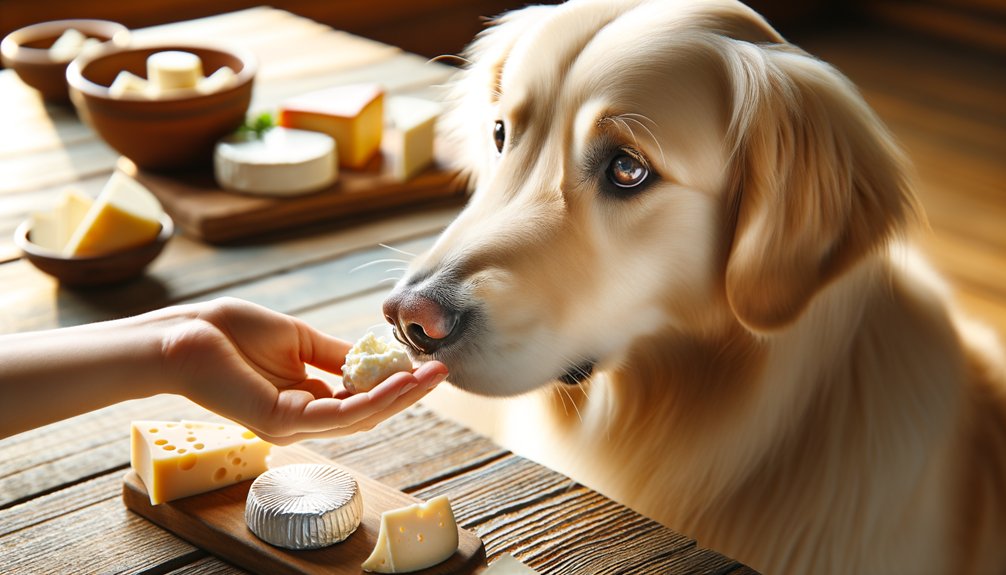Some people see cheese as either a delicious treat for dogs or a dangerous food risk. However, the truth is more complex. The safety of cheese depends on factors such as lactose levels, serving sizes, your dog’s metabolism, and other elements of its diet.
To add cheese safely to your dog’s meals, you need to understand the basics behind it. Look at the facts instead of old myths. This guide clears up common misunderstandings and offers clear feeding advice. By following these insights, you can improve your pet’s diet with confidence and care.
Key Takeaways
- Cheese gives nutrients like calcium and protein, but it must be given in moderation to avoid too much fat and salt.
- Not all cheeses are bad. Low-lactose options like mozzarella and aged cheddar are safer and easier to digest.
- Blue cheese and highly processed cheeses should be avoided. They often contain harmful substances and excess salt.
- Cheese should be an occasional treat—no more than 10% of a dog’s daily calories—to prevent obesity and digestive issues.
- Always choose mild, soft cheeses with minimal additives. Monitor your dog’s tolerance to lactose and salt.
How New Trends Are Changing Dog Nutrition

At the forefront of canine nutrition innovation, cheese emerges not merely as a snack but as a strategic nutritional asset. Its inherent nutrients align seamlessly with emerging dietary trends, reinforcing balanced meals with layers of bioavailable proteins, vitamins, and minerals. When enhanced with targeted functional ingredients—such as carefully cultivated probiotics and robust antioxidants—cheese transforms into a multipurpose tool that amplifies digestive health, immune resilience, and overall vitality. Embracing these advances equips you to navigate and shape the future of dog nutrition with precision and evidence-based strategies.
Nutritional Benefits Overview
Can cheese change your dog’s diet in more ways than just adding flavor? Cheese gives your dog extra calcium. This helps build strong bones and teeth. Many cheeses also have probiotics. These can help your dog digest food better and keep its gut balanced.
By adding cheese in smart ways, you give your dog more than just taste. You add extra nutrition to its diet. Remember to use cheese in moderation to avoid too much fat and salt.
Emerging Feeding Trends
Dog nutrition is evolving. New feeding trends mix health with innovation. Many pet owners now try plant-based diets. These diets help reduce allergens and lower environmental impact. They focus on balanced meals with carefully chosen ingredients.
You can also add homemade cheese recipes that match your dog’s tolerance. By controlling the ingredients, you avoid additives and extra lactose. This way, you give your dog safe, nutrient-rich treats that help digestion and satisfy its taste.
Staying up-to-date with these trends lets you create a diet that meets your dog’s unique needs. Embracing sustainable, health-conscious options gives your dog both variety and well-being in every meal.
Cheese in Balanced Diets
Adding cheese to your dog’s balanced diet can boost nutrition and follow modern feeding trends. You can choose different kinds of cheese, like low-lactose options such as mozzarella or aged cheddar, to provide protein, calcium, and good fats.
These cheeses can help digestion by offering probiotics and enzymes that support gut health when used correctly. Remember, moderation is important; too much high-fat or high-lactose cheese may upset your dog’s stomach.
Integrating Functional Ingredients
When you add functional ingredients to your dog’s diet, you unlock benefits beyond basic nutrition. These ingredients, often made through fermentation, help boost gut health and strengthen the immune system.
You can also use flavor-enhancing techniques to make these additions both tasty and healthy for your dog. Here are some points to consider:
- Fermentation processes produce probiotics that aid digestion and nutrient absorption.
- Functional ingredients can reduce inflammation and promote joint health.
- Flavor enhancement ensures your dog enthusiastically accepts these beneficial additions.
- Incorporating such ingredients supports long-term wellness and vitality.
Future Canine Nutrition
Dog nutrition has come a long way, and the future holds even more exciting changes. New research in cheese fermentation and aging shows that these methods may boost probiotics and make nutrients easier for your dog to absorb.
Soon, special fermentation processes will help add beneficial bacteria that support your dog’s digestion, gut health, and immune system.
These improved dairy techniques, combined with personalized nutrition plans, will let you tailor diets to fit your dog’s unique microbiome and health needs.
By learning about these innovations, you can confidently choose safe and effective cheese-based supplements.
Embracing these scientific breakthroughs means you can improve your dog’s overall well-being, making sure its diet keeps up with the latest knowledge and supports long-term health.
Detailed look: nutrition facts, health risks, and vet case studies
To decide if cheese is safe for your dog, you must understand its nutrients. Look at its protein, fat, and calcium levels. Also, know the risks—like lactose intolerance and obesity—that may affect your dog.
We review veterinary case studies to offer proven advice on using cheese as a treat.
Cheese Nutrient Breakdown
Because cheese contains a complex mix of nutrients, understanding its detailed nutritional profile is essential before incorporating it into your dog’s diet. Cheese aging impacts nutrient density, influencing protein and fat levels.
You should also consider dairy alternatives if your dog is lactose intolerant.
Key nutrients to evaluate include:
- Protein – supports muscle health but varies with cheese aging.
- Fat – provides energy but can contribute to weight gain if excessive.
- Calcium – crucial for bone strength; aged cheeses often have higher levels.
- Lactose – a sugar that some dogs can’t digest well; dairy alternatives may minimize risks.
Potential Health Concerns
When you add cheese to your dog’s diet, you must consider its health effects. Cheese is high in fat and lactose, which can upset a dog’s stomach. Dogs that are sensitive to dairy might experience gastrointestinal issues.
If your dog is allergic to dairy, even a small amount can lead to itching, swelling, or digestive trouble. This is especially common in breeds that are lactose intolerant or have sensitive stomachs.
Giving your dog too much cheese can also cause obesity or pancreatitis because of its rich fat content. To be safe, start with a very small portion and watch your dog closely for any adverse reactions.
Veterinary Case Insights
Although cheese can offer certain nutritional benefits to dogs, veterinary case studies reveal a complex balance between its advantages and potential health risks. When considering cheese as a dog treat, you must be aware of individual sensitivities and dietary needs.
Veterinarians highlight:
- Cheese provides protein and calcium but is high in fat, requiring moderation.
- Some dogs develop cheese allergies, leading to digestive upset or skin issues.
- Lactose intolerance can cause diarrhea and discomfort even without allergies.
- Expert case studies recommend introducing cheese gradually and observing reactions carefully.
Easy Feeding Tips and Expert Pet Care Advice
Use proper portions for your dog’s cheese treats. This keeps them safe and healthy. Pick dog-friendly cheeses that are low in lactose and have few additives. These tips ensure your pet enjoys cheese without harm.
Portion Control Techniques
How can you guarantee your dog enjoys cheese without compromising their health? Mastering portion control is essential. Proper portion sizing ensures you provide just enough cheese to delight your dog without overfeeding. Treat moderation prevents excess calories and digestive issues.
Follow these expert-backed techniques:
- Use small, bite-sized pieces to keep cheese treats manageable.
- Limit cheese treats to no more than 10% of your dog’s daily caloric intake.
- Replace regular treats with cheese occasionally to avoid overfeeding.
- Monitor your dog’s reaction and adjust portions if you notice any digestive discomfort.
Selecting Dog-Friendly Cheeses
Choose cheeses that are low in lactose and salt for your pet. Mozzarella, cottage cheese, or mild cheddar are good choices. They usually have fewer additives and less salt.
Softer cheeses are easier for your dog to digest. They also reduce the risk of choking, especially for small dogs. Avoid blue cheese and highly processed cheeses, as these can contain too much salt or harmful ingredients.
Always check the label for any additives or preservatives before giving cheese to your dog. By choosing the right types of cheese, you can safely offer it as an occasional treat.
This expert advice helps you take care of your pet in a smart and safe way.



